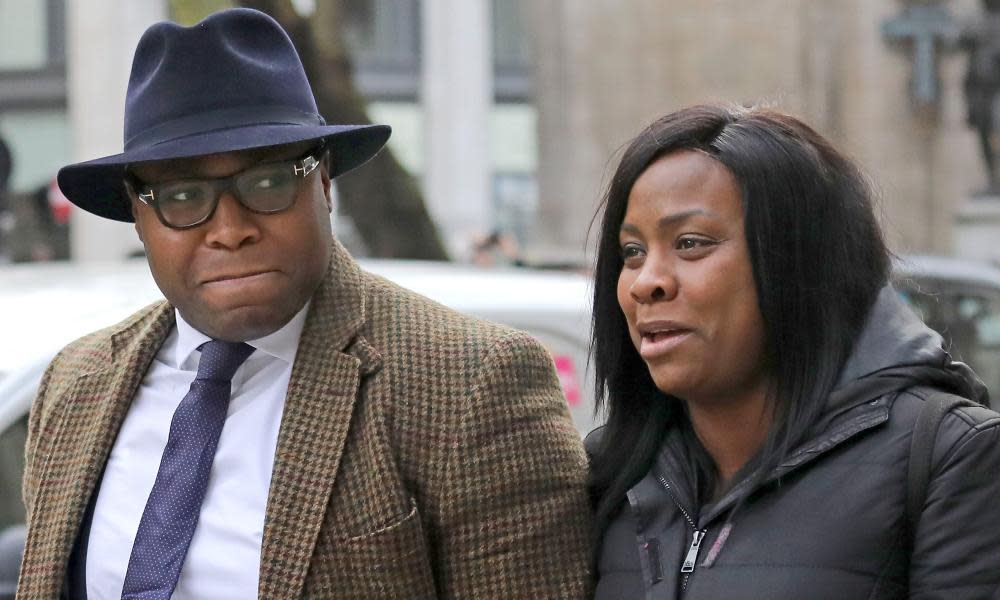Father of baby about to lose life support denied hospital access

The father of Isaiah Haastrup, the profoundly brain-damaged baby boy whose life support system is to be turned off, has been banned from visiting him in hospital even though his son may only have days to live.
Lanre Haastrup, 36, has launched a high court battle to overturn the ban by King’s College hospital NHS foundation trust, after allegations by staff treating Isaiah that he had been verbally abusive and aggressive.
Haastrup told the court he had not been violent and the ban was out of proportion. “I have a right to see my son. If he dies without me seeing him that would be irreparable damage,” he told Mr Justice Newton in an urgent application for judicial review.
Doctors were given permission to withdraw life support from Isaiah, who is one, after a court ruling in January. He suffered catastrophic brain injury after being deprived of oxygen at birth and cannot move or breathe unaided, is on a ventilator and has a profoundly depressed level of consciousness.
His father has applied for permission to appeal against the ruling.
Trust between Isaiah’s parents, who opposed life-saving treatment being withdrawn, and the hospital trust had broken down, the court heard. Haastrup had been banned from visiting, but a compromise was reached where he was able to see his son, restricted to three hours each evening.
On Tuesday, he told the court, he received a letter telling him he had once more been banned after an incident at the weekend that led to allegations by staff that he had been verbally abusive and aggressive. The trust told him his behaviour had created significant anxiety and undue stress to trust staff and other acutely unwell children on the intensive care ward.
Haastrup told the judge: “My son may only have a few days to live.” Speaking of the alleged weekend incident, he said he had done nothing other than have a conversation “like I am having with you now. But certain people don’t like what I am saying,” he said.
He added: “Of course, matters are in court. Emotions are running high. I have never been violent.”
Fiona Paterson, counsel for the trust, told the judge that her client was conscious of the circumstances faced by Haastrup and Isaiah’s mother, Takesha Thomas, 36. “The trust is trying to deal with this in a humane way,” she told Newton.
As a result Haastrup’s ban would be temporarily lifted to allow him to attend a hospital meeting on Thursday morning to discuss Isaiah’s palliative treatment, she said. A further court hearing on the visiting ban will take place on Thursday.
King’s College hospital said in a statement: “Throughout his son’s time at King’s, Mr Haastrup’s behaviour has frequently fallen short of acceptable standards. His persistent verbal aggression, intimidation and threatening behaviour towards staff caring for Isaiah resulted in the trust issuing him with a behavioural agreement in May 2017. Despite the agreement, his behaviour has continued to be unacceptable.
“Mr Haastrup was banned at the start of November last year, and unfortunately once again at the weekend his behaviour on the ward not only scared and intimidated staff but also frightened other children and families, which resulted in the trust’s security team being called.
“Behaviour that causes distress to those in our care and endangers our staff is unacceptable and will not be tolerated. Such standards apply to anyone attending the hospital and therefore Mr Haastrup is currently banned from the ward.”
In a hectic day of hearings, Haastrup appeared earlier before three appeal court judges to plead for a three-week adjournment in order to prepare his appeal against the ruling ordering treatment to be withdrawn. He argued he wished to produce experts on hyperbaric oxygen therapy and deep brain stimulation, believing such treatments might help ease his son’s condition.
“If the treatment would assist Isaiah and is available and affordable, why rush to end his life when these treatments are available to other children?” he said. “Once a life is taken no one can give it back. If you refuse this adjournment, Isaiah will die.
“I’m inviting you to temper justice with mercy.”
Paterson said Isaiah’s injuries were so grave – and he had been examined by experts from five different hospitals – that it would be remarkable if such treatments had not been previously considered and they were highly unlikely to be productive.
The judges will make their ruling on Friday. In his original judgment on 29 January, Mr Justice MacDonald said it was with “profound sadness” that he found it was not in Isaiah’s best interests for life-sustaining medical treatment to be continued, and that he had no prospects of recovery.

 Yahoo News
Yahoo News 
